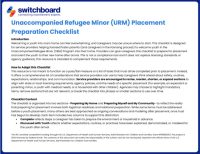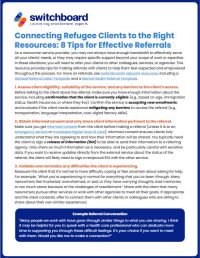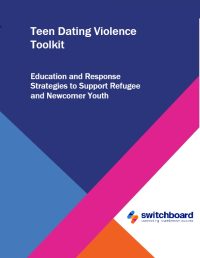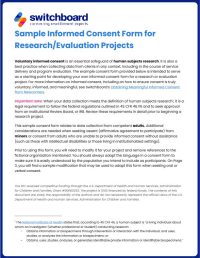Resources
Our multimedia resource library features content developed by both Switchboard and the larger resettlement community. You can browse the library by resource type, topic, population group, language, or publication year, or by using keywords through our search bar.
The external resources listed in this library represent the views and opinions of their original authors and do not necessarily represent the views or opinions of Switchboard.
Refine Results
FIRST PUBLISHED
RESOURCE TYPE
TOPIC
TARGET AUDIENCE
PUBLISHED BY
POPULATION
LANGUAGE
PUBLISHED BY:
Affordable housing programs in the United States can be complex, especially for staff who support newcomers navigating these systems for the first time. This blog post provides an overview of key affordable housing programs, terminology, and eligibility requirements. Although every community operates differently, these concepts will help you assess client eligibility, make informed referrals, and […]
PUBLISHED BY:
Welcoming a youth into one’s home can feel overwhelming, and caregivers may be unsure where to start. This checklist is designed for service providers helping licensed foster parents (and caregivers in the licensing process) to welcome youth in the Unaccompanied Refugee Minor (URM) Program into their home. Providers can give caregivers this checklist to prepare […]
PUBLISHED BY:
As the refugee resettlement sector has experienced a decline in arrivals, and enrollments into Office of Refugee Resettlement (ORR) programs have reduced, service providers are thinking creatively about outreach. Engaging “overlooked” ORR-eligible populations can help providers meet program goals even when arrival numbers are low. This blog post will help you identify potentially eligible clients […]
PUBLISHED BY:
As a newcomer service provider, you may not always have enough bandwidth to effectively serve all your clients’ needs, or they may require specific support beyond your scope of work or expertise. In these situations, you will need to refer your clients to other colleagues, services, or agencies. This resource provides tips for making referrals […]
PUBLISHED BY:
Teen dating violence (TDV), sometimes called dating abuse or dating violence, refers to any pattern of behaviors used to gain or maintain power and control in a dating or romantic relationship between partners who are teenagers (between the ages of 12 and 20). TDV can happen in person or through technology and includes behaviors that […]
TOPIC:
SUBTOPIC:
PUBLISHED BY:
Meaningful informed consent entails more than a participant’s signature on a consent form. The steps that we take for obtaining consent are crucial to safeguarding participants’ dignity, autonomy and well-being, especially when collecting data from vulnerable populations. This template is intended to serve as a starting point when developing a consent form for a research […]






